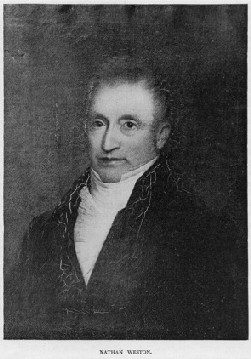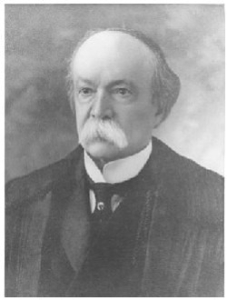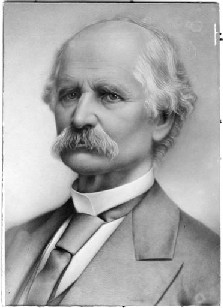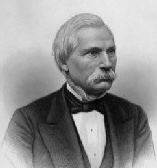Up and Down the Kennebec Valley: Courts – Part 3
by Mary Grow
Remembering that Maine’s early population centers were along the coast, and mostly from Portland south, it is not surprising that three of Maine’s first four state Supreme Court chief justices came from that area.
The first (mentioned last week) was Prentiss Mellen, from Portland, who served from July 1, 1820, to Oct. 11, 1834, when he reached mandatory retirement age.
He was succeeded by Augusta’s Nathan Weston, serving from Oct. 22, 1834, to Oct. 22, 1841 (see below). Ezekiel Whitman, from Portland, took office Dec. 10, 1841, and resigned Oct. 23, 1848. Ether Shepley, from Saco (south of Portland) took office on Oct. 23, 1848, and served until Oct. 22, 1855.
Shepley was succeeded on Oct. 23, 1855, by the first chief justice from farther inland, John S. Tenney, from Norridgewock. Since then, chief justices have come from various parts of the Maine, including Houlton, in Aroostook County, and Calais, in Washington County on the Canadian border.
In the 19th century, Augusta was the only one of the dozen central Kennebec Valley municipalities these history articles have covered to provide justices to the state Supreme Court. In the 20th century, Waterville joined the list, starting with Warren C. Philbrook, associate justice from April 9, 1913, to Nov. 29, 1928.
* * * * * *
As listed in the March 27 story in this series, the four 19th-century Augusta judges appointed to the Maine Supreme Court were:
— Nathan Weston, appointed an associate justice July 1, 1820, and served as chief justice from Oct. 22, 1834 to Oct. 21, 1841;
— Richard Drury Rice, associate justice from May 11, 1852 to his resignation Dec. 1, 1863;
— Artemas Libbey (or Libby), appointed from April 24, 1875, to April 24, 1882; reappointed Jan. 11, 1883, and served until his death March 15, 1894; and
— William Penn Whitehouse, appointed associate justice April 15, 1890, and chief justice July 26, 1911; resigned April 8, 1913.
* * * * * *
Nathan Weston, often called Hon. Nathan Weston, was the oldest son of Capt. Nathan Weston and his third wife, a widow from Salem, Massachusetts, named Elizabeth Cheever. Capt. Weston came to Hallowell in 1778 and in 1781 moved north to what became Augusta, where he was a businessman; representative to the Massachusetts legislature (1799 and 1801) and later the Maine Senate; and in 1803 a selectman.
Hon. Nathan Weston was born July 27, 1782. According to the biography in James North’s 1870 history of Augusta, he attended Hallowell Academy and graduated from Dartmouth College in 1803. He studied law in Boston and was admitted to the bar in 1806; practiced briefly in Augusta, then moved to New Gloucester. From there, North said, he was elected to the Massachusetts legislature in 1808.
He and Paulina Bass Cony were married on May 13 or June 4, 1809, in New Gloucester or Augusta (sources differ). She was Augusta Judge Daniel Cony’s daughter, born Aug. 23 or Aug. 27, 1787. The Westons had four sons and two, three or four daughters between 1813 and 1823.
In March 1810 the Westons returned to Augusta. North surmised that marrying Paulina “probably induced his change of residence.”
In 1811, as summarized in the March 27 issue in this series, the court of common pleas was changed into a circuit court, and Massachusetts Governor Elbridge Gerry needed to choose three judges for the second circuit (Kennebec, Lincoln & Somerset counties).
North explained that the governor was expected to appoint Weston as one of the two associate judges. However, his candidate for chief justice got so many critical comments that Gerry discarded him entirely, and chose the younger of the two associate nominees, Weston, as the chief justice.
North described Weston as an acquaintance of the governor (from his legislative service, presumably), “a young man of twenty-nine years of age, of respectable connections, pleasing address and good conversational powers, with a legal reputation for more than ordinary ability for one of his years.”
Weston held the circuit court position until Maine’s first governor, William King, appointed him an associate justice of the Maine Supreme Court in 1820, the year the state came into existence. From Oct. 22, 1834, 1834, to Oct. 22, 1841, he served as the state supreme court’s second chief justice; North wrote that he retired when his term ended.
In 1825, North said, Weston was nominated for the Maine governorship. He “declined the honor.”
North’s writing suggests that he knew both Westons personally, but he said nothing about what the judge did after 1841. Earlier, he had written that the 1811 appointment was the beginning of a 30-year uninterrupted judicial career, implying that after 1841, Weston accepted no other judgeship.
North presented one evidence that Weston continued to be a respected citizen. He wrote that “the venerable Nathan Weston” was a speaker at a Monday, April 22, 1861, public meeting, part of Maine’s response to the beginning of the Civil War. Other speakers included Lot M. Morrill, former three-term governor and in 1861 United States Senator; and James G. Blaine, then a member of the state House of Representatives and chairman of the state Republican Committee (later a national legislator, secretary of state and presidential candidate).
In his judicial opinions, North wrote, Weston displayed “classic and judicial learning.” He wrote with “clearness and purity of diction.” He was an entertaining and informative conversationalist, and remained in good health into his late 80s.
Paulina Weston died “greatly beloved” on Sept. 11, 1857, North said. Her widower died June 4, 1872, shortly before his 90th birthday.
* * * * * *
Richard Drury Rice was born in Union, Maine (then Union, Lincoln County, Massachusetts), on April 10, 1810, the on-line Cleaves Law Library says; his father was Hon. Nathan D. Rice.
North said Rice apprenticed in the printing business in Thomaston and elsewhere and worked as a printer “for several years.” Then he enrolled at China Academy, in “classical studies.”
Moving next to Hallowell, he was “proprietor and editor” of an anti-Masonic newspaper called the “Maine Free Press.” By 1836, he owned a bookstore in Augusta.
He sold the bookstore in 1839 and read law in James W. Bradbury’s Augusta office. Admitted to the Kennebec County bar in 1840, he practiced with Bradbury.
(Bradbury was an Augusta lawyer and from 1846 to 1853 a United States Senator. His chapter on the Kennebec Bar in Henry Kingsbury’s 1892 Kennebec County history begins: “My acquaintance with the Kennebec Bar commenced sixty-one years ago. In April, 1830, I opened my office in Augusta. The new granite courthouse had just been completed, and the May term of the law court was held in it by Chief Justice Mellen and his two associate justices, Weston and Parris [Albion Parris, from Portland].”)
From August 1844 to May 1848, North wrote, Rice also owned and edited the Augusta newspaper “The Age”, which had been founded in December 1831 in response to the legislature’s move from Portland to Augusta.
(This newspaper had many owners; North listed them, ending with “Gilman Smith, in whose hands it died during the great rebellion.”)
In 1848, Maine Governor John W. Dana appointed Rice a district court judge. On May 11, 1852, Governor John Hubbard appointed him an associate justice of the state Supreme Court.
Rice apparently maintained his connections with Bradbury, for North described another pre-Civil War event on April 18, 1861. A parade, led by the Pacific Fire Engine Company and featuring the Augusta band, went to Governor Israel Washburn, Jr.’s, quarters for a speech, then to Bradbury’s house for another.
Bradbury told them it was “the duty of every patriot to sustain the government and defend the flag of the country.” Then “Judge Rice, who happened to be at Mr. Bradbury’s, was called out, and expressed equally sound and patriotic sentiments.”
Rice resigned his judgeship on Dec. 1, 1863, to become president of the Portland and Kennebec Railroad Company, a position North said he still held in 1870. Of this change, North observed, “This is one of the instances, in our day, in which the judicial ermine has been laid aside, not, as sometimes, for the inviting garb of commerce, but for the comfortable cloak of transit and travel, owing to the brief tenure of judicial office, and the inadequate pay accorded to legal ability.”
(The “judicial ermine” is a reference to British formal judicial robes, which were lined with ermine, “emblematic of purity and honor without stain.”)
Rice married twice, North said. His first wife was Anne R. Smith, from Hallowell, whom he married April 10 or 12, 1836. They had a son, Albert Smith Rice, born April 4, 1837.
Anne died June 15, 1838. On Nov. 18, 1840, Rice married a widow named Almira (Emery) (Robinson), born in 1813, by whom he had a daughter, Abby Emery Rice, born May 8 or May 18, 1842, and according to FamilySearch, a son, Howard, born March 9, 1853.
Rice died in Augusta on May 27, 1882, aged 72. FamilySearch says he is buried in Augusta’s Forest Grove cemetery; Find a Grave finds no one named Rice there.
* * * * * *
Artemas Libbey (sometimes Libby) was born in Freedom, Maine, on Jan. 8, 1823. When he was about two, his family moved to Albion, where, Cleaves Law Library says, he “attended local schools.”
The Cleaves Law Library site (which spells his name Libby) says he studied law first under Samuel S. Warren, in Albion, and then under Z. (Zebah) Washburn, in China.
Find a Grave, quoting an unnamed source, says Libbey met Warren in 1840. Warren’s son, about two years younger than Libbey, was studying law with his father, and Warren persuaded Libbey to join the boy.
Find a Grave continues, “In the next winter he [Libbey] taught a town school, and then returned to Mr. Warren’s office, and began in the summer to read law, keeping up his other studies. He continued to study and read law there, except a few months in the winter occupied in teaching, until the summer of 1844, when Mr. Warren removed to Massachusetts.”
Libbey must have been well advanced in his studies when he came under Washburn’s tutelage, because he was admitted to the bar in the fall of 1844, at the age of 21. He opened his first office in Albion.
(Warren, according Bradbury’s chapter on the Kennebec bar in Kingsbury’s history, practiced law in Hallowell from before 1825 to around 1835, then in China, then in Albion, until he moved to Massachusetts about 1844. Zebah Washburn, born in Wayne in 1797, practiced law in China “until he was seventy years old.”)
The Cleaves site says Libbey practiced in Albion for 11 years, and moved to Augusta in 1858. But it also says he was elected an Augusta representative to the state legislature in 1852, and in 1856 was on Governor Samuel Wells’ executive council.
On April 23, 1875, Governor Nelson Dingley, Jr., appointed Libbey an associate justice of the Maine Supreme Court; he served until April 23 or April 24, 1882. On Jan. 11, 1883, Governor Frederick Robie appointed him again; and he must have been reappointed early in 1890, because the Cleaves site says he served until his death on March 15 or Aug. 15, 1894.
Libbey married Louisa H. Snow (March 1, 1825 – Nov. 17, 1895). Find a Grave says their only son, Albert, was born and died in the spring of 1852; Bradbury wrote in Kingsbury’s history that their son Arthur was admitted [to the bar?] in 1877.
FamilySearch helps reconcile these accounts: it dates the marriage Oct. 27, 1847, and says the couple had four children: Emma L. (1850-1883); Albert (born and died in 1852); Arthur (1854 -1882); and George W. (1864 – 1938).
Augusta’s Forest Grove Cemetery contains gravestones for Artemas, Louisa and son Arthur. Find a Grave says Arthur, born Feb. 2, 1854, died June 3, 1882, of typhoid fever.
Main sources
Kingsbury, Henry D., ed., Illustrated History of Kennebec County Maine 1625-1892 (1892).
North, James W., The History of Augusta (1870).
Websites, miscellaneous.
Responsible journalism is hard work!
It is also expensive!
If you enjoy reading The Town Line and the good news we bring you each week, would you consider a donation to help us continue the work we’re doing?
The Town Line is a 501(c)(3) nonprofit private foundation, and all donations are tax deductible under the Internal Revenue Service code.
To help, please visit our online donation page or mail a check payable to The Town Line, PO Box 89, South China, ME 04358. Your contribution is appreciated!







Leave a Reply
Want to join the discussion?Feel free to contribute!